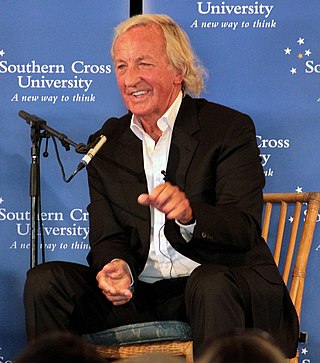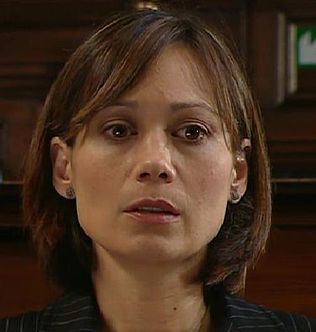Related Research Articles

John Richard Pilger is an Australian journalist, writer, scholar, and documentary filmmaker. He has been mainly based in Britain since 1962. He was also once visiting professor at Cornell University in New York.

The Wednesday Play is an anthology series of British television plays which ran on BBC1 for six seasons from October 1964 to May 1970. The plays were usually original works written for television, although dramatic adaptations of fiction also featured. The series gained a reputation for presenting contemporary social dramas, and for bringing issues to the attention of a mass audience that would not otherwise have been discussed on screen.

Francis Kelly was an Irish actor, singer and writer, whose career covered television, radio, theatre, music, screenwriting and film. He is best remembered for playing Father Jack Hackett in the Channel 4 sitcom Father Ted.

Alison Rosalind Bracknell, known professionally as Leah Bracknell, was an English actress who played the role of Zoe Tate in the ITV soap opera Emmerdale (1989–2005), for which she was nominated for the 2002 National Television Award for Most Popular Actress and won the 2006 British Soap Award for Best Exit. She was also a qualified teacher with the British School of Yoga and designed and produced a jewellery line.
Christopher John Chittell is an English actor, known for his role as Eric Pollard in the ITV soap opera Emmerdale. He has portrayed the role since 1986, making him the longest-serving cast member in the soap's history.
Tony Garnett was a British film and television producer, and actor. Best known for his thirteen-year association with director Ken Loach, his work as a producer continued into the 21st century.
Christopher Winton Beeny was an English actor and dancer. He had a career as a child actor, but was best known for his work as the footman Edward Barnes on the 1970s television series Upstairs, Downstairs, as Billy Henshaw in the sitcom In Loving Memory, and as the incompetent debt collector and golfer Morton Beamish in Last of the Summer Wine.

Henry Wilks is a fictional character from the British television soap opera Emmerdale, played by Arthur Pentelow. He ran the Woolpack public house alongside Amos Brearly for nearly 20 years.
Stephen Harold Halliwell is an English actor, known for portraying the role of Zak Dingle in the ITV soap opera Emmerdale, which he has played since 1994.

Dolly Skilbeck is a fictional character from the British television soap opera Emmerdale. Dolly made her first on-screen appearance during the episode broadcast on 22 February 1977. The character was initially played by Katharine Barker, before Jean Rogers took over the role in 1980. She remained in the role until her departure from Emmerdale in 1991. Dolly is characterised as kind, generous and a homemaker. She is a "townie" from Darlington who arrives in Beckindale to work at the local pub, The Woolpack. Writers quickly developed a romance with Matt Skilbeck. He was a widower and had previously has two children that had died.
Madeleine Howard is a British actress known for her role as Sarah Sugden, from 1988 to 1994 in the soap opera Emmerdale. She has also appeared in other TV programs such as The Bill, Holby City, Doctors, Howards Way and Tricia Pope in Gems.
Michael Robin Christiansen was a British newspaper editor.
Charles Denton is a British film and television producer and executive.
Gavin John Blyth was a British television producer and journalist. He was well known for being series producer of Emmerdale from January 2009 until his death. Beginning his career in 2002, he joined Emmerdale in 2003 as a writer. He later went on to be an assistant producer and also a story editor on Coronation Street.
Annie Hulley is an English television and stage actress who has appeared in the British soap-operas Emmerdale as Karen Moore and Coronation Street. Hulley wrote the play Dog Days as she was 'frustrated at the lack of roles for mature actresses'.

Utopia is a 2013 documentary film written, produced and presented by John Pilger and directed by Pilger and Alan Lowery, that explores the experiences of Aboriginal Australians in modern Australia. The title is derived from the Aboriginal homeland community of Utopia, Northern Territory, one of the poorest and most desolate areas in Australia.
The Secret Country: The First Australians Fight Back is a 1985 television documentary made for the British Central Independent Television company by writer/presenter John Pilger and producer/director Alan Lowery. It details the persecution of Aboriginal Australians and Torres Strait Islanders throughout Australia's history.

Kenneth Charles Loach is a British film director and screenwriter. His socially critical directing style and socialist ideals are evident in his film treatment of social issues such as poverty, homelessness, and labour rights.
Sir David Nicholas was a British broadcast journalist, ITN editor-in-chief, chief executive (1977–1989), and chairman (1989–91).
References
- ↑ "Observer review: Which Side are You On? by Anthony Hayward". The Guardian. 16 May 2004.
- ↑ "Famous Wordsworthians - Bishop Wordsworth's School". www.bishopwordsworths.org.uk.
- ↑ "University of the Arts List of alumni at the London College of Communication"
- ↑ Anthony Hayward CV.
- ↑ Portfolio of selected articles by Anthony Hayward
- ↑ Julian Petley (13 March 2001). "The changing nature of television censorship". The Independent.[ dead link ]
- ↑ Knightley, Phillip (22 July 2016). "Book Reviews : Is he a poet or a journalist?". British Journalism Review. 12 (2): 71–73. doi:10.1177/095647480101200213. S2CID 145397598.
- ↑ Far Eastern Economic Review, 14 June 2001
- ↑ The Independent , 13 March 2001
- ↑ Den Shewman "Review: ‘In The Name of Justice, The Television Reporting of John Pilger’", Variety, 16–22 April 2001
- ↑ Anthony Hayward "Fact: Self-publishing my non-fiction as ebooks makes sense", The Guardian, 19 November 2013
- ↑ In the Name of Justice book sample
- ↑ Sukhdev Sandhu (23 May 2004). "The passion of real lives". The Daily Telegraph.
- ↑ Anthony Hayward (3 November 2006). "Cathy Come Home: The true story behind Britain's most famous TV drama". The Independent.
- ↑ New Statesman, 28 June 2004.
- ↑ "Bloomsbury Publishing Author Biography".
- ↑ "John Pilger at the 2006 Guardian Hay Festival"
- ↑ "Observer review: Which Side are You On? by Anthony Hayward". The Guardian. 16 May 2004.
- ↑ "Radical auteur out for blood". Times Higher Education (THE). 4 March 2005.